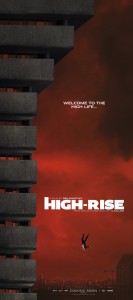 Just the other week I reviewed “Dark,” a film in which a woman faced her inner demons during a blackout. This week, I’m reviewing “High-Rise,” in which the demons of humanity are the threat during a blackout. The blackout occurs in a futuristic high-rise and it causes the citizens to let loose their animalistic instincts. Just as soon as those lights go out, so does their aggression.
Just the other week I reviewed “Dark,” a film in which a woman faced her inner demons during a blackout. This week, I’m reviewing “High-Rise,” in which the demons of humanity are the threat during a blackout. The blackout occurs in a futuristic high-rise and it causes the citizens to let loose their animalistic instincts. Just as soon as those lights go out, so does their aggression.
Mind you, the demons were slowly being unleashed prior to the blackout. Tensions had begun to rise just as soon as the high-rise was erected. Despite housing those who would be deemed as financially superior by most, class warfare has erupted between the floors. Those on the lower floors feel discriminated against by those at the top, specifically from Royal (Jeremy Irons), the architect and overlord of the high-rise. He and his wife pay little mind to the chaos ensuing beneath them, occupying their time with whatever extravagant activities they can muster to distract themselves from their loveless marriage and existence.
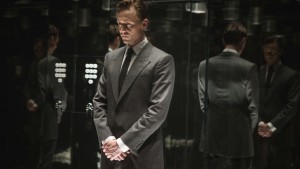 Caught in the middle is Laing (Tom Hiddleston), a doctor who’s recently moved into the high-rise. Due to his status, he lives near the top, but that doesn’t mean he’s well-liked by those surrounding him. Munrow (Augustus Prew), an underling of his at the hospital, looks down at him when in the high-rise, even going so far as to humiliate him at a party by having him ejected. There’s tension towards him from those on the lower level as well, but they warm up to him as he shows his true colors and sticks by them.
Caught in the middle is Laing (Tom Hiddleston), a doctor who’s recently moved into the high-rise. Due to his status, he lives near the top, but that doesn’t mean he’s well-liked by those surrounding him. Munrow (Augustus Prew), an underling of his at the hospital, looks down at him when in the high-rise, even going so far as to humiliate him at a party by having him ejected. There’s tension towards him from those on the lower level as well, but they warm up to him as he shows his true colors and sticks by them.
There’s an overabundance of colorful characters residing in the high-rise to the point that they come across more as caricatures than humans. That is the intention of Ben Wheatley, who’s adapting J.G. Ballard’s novel (with the script being written by Amy Jump) and using it to create a farce out of the upper class and, essentially, humanity in general. While this may come across as cheap commentary, it’s actually more damning for him to classify his characters as caricatures as it presents them as not being worthy of human decency. The film’s tone is that of a farce, albeit a very dark one.
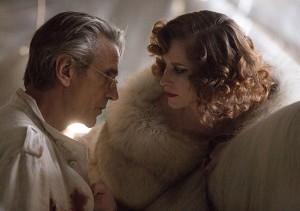 There is some humanity to be found in the film. Laing is easily the most humane of the cast, with his love interest Charlotte (Sienna Miller) rising above her status as a slut and providing a good counterbalance to Laing. His bonding with her son, Toby (Louis Suc), is rather heartwarming whilst still reveling in the dark comedy. There’s a particular cheeky moment where Toby asks Laing why he doesn’t have a wife, with Laing instinctively firing back with asking why Toby doesn’t have a father. His immediate shame over asking this is funny, made even funnier by Toby’s nonchalant dismissal of it. This also works as a commentary on the depravity surrounding Toby, as he’s grown numb to what would shock a child his age.
There is some humanity to be found in the film. Laing is easily the most humane of the cast, with his love interest Charlotte (Sienna Miller) rising above her status as a slut and providing a good counterbalance to Laing. His bonding with her son, Toby (Louis Suc), is rather heartwarming whilst still reveling in the dark comedy. There’s a particular cheeky moment where Toby asks Laing why he doesn’t have a wife, with Laing instinctively firing back with asking why Toby doesn’t have a father. His immediate shame over asking this is funny, made even funnier by Toby’s nonchalant dismissal of it. This also works as a commentary on the depravity surrounding Toby, as he’s grown numb to what would shock a child his age.
Some of the depravity that encompasses the high-rise include numerous parties in which booze and drugs flow as freely as they would at a Hollywood executive meeting. Toby and the other children aren’t hidden from these parties, at least not well, corrupting their minds in the process (with the commentary being we as a society are corrupting our youth). Even a child’s birthday party devolves into anarchy, with the ritzy upper class’ pool party being crashed by the children and their rabid parents. This is results in bloody fights erupting and even a dog being slain in the crossfire.
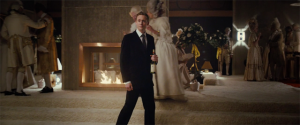 The high-rise itself is just as much of a character as any of the humans. It’s a towering paradise that comes equipped with a pool, a spa, a gym, a garden on the roof, and even its own supermarket on the fifteenth floor. I was actually taken aback when I seen Laing leaving the building to go to the hospital, as I started to believe there was one built into the high-rise itself. There’s even a crack by Laing and a fellow tenant who each remark that they can’t remember where they parked in the endless parking lot. Why leave the high-rise when it comes with everything you could ever need?
The high-rise itself is just as much of a character as any of the humans. It’s a towering paradise that comes equipped with a pool, a spa, a gym, a garden on the roof, and even its own supermarket on the fifteenth floor. I was actually taken aback when I seen Laing leaving the building to go to the hospital, as I started to believe there was one built into the high-rise itself. There’s even a crack by Laing and a fellow tenant who each remark that they can’t remember where they parked in the endless parking lot. Why leave the high-rise when it comes with everything you could ever need?
Ben Wheatley is known for his visceral style, as made prominent in his past films such as “Kill List” and “Sightseers.” That trademark is felt when all hell breaks loose during the power outage. The fights that erupt are raw and unflinching, feeling a little too real at times. This is made all the more unsettling when Ben combines the dark humor with the violence, much like he did in “Sightseers.”
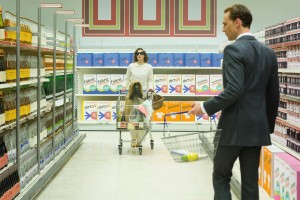
There’s so much going on in “High-Rise” that it’s easy to get lost. I didn’t even mention Wilder (Luke Evans), the abrasive documentarian whose mission is to expose the corruption within the high-rise. His trek to the top level reminded me of the passengers’ quest to the front of the train in Bong Joon-ho’s “Snowpiercer,” another film depicting the fall of humanity. While he and his pregnant wife, Helen (Elisabeth Moss), get lost in the shuffle, Wheatley makes sure their presence is still felt. It almost feels appropriate that they do get lost in the sea of humanity, as they’re lower level residents who get overlooked by those on the upper level.
“High-Rise” will turn many off as it could be seen as being too on the nose with its message on class warfare. That’s what I found to be its strongest suit. To try and make a deep psychological analysis on the fall of humanity would go against the tone of the story in that man’s ego will be his downfall. While that could certainly be pulled off, it’s arguably harder to do it as a farce. A task Ben Wheatley accepted and successfully pulled off!
Final Rating: A-
